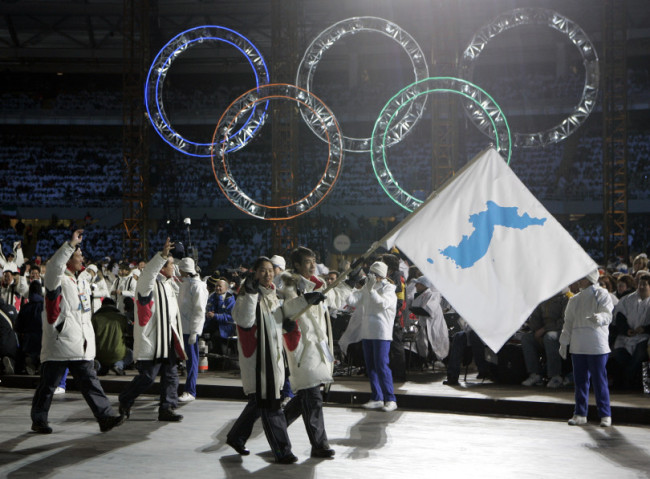South Korea has agreed to North Korea’s proposal of holding working-level talks Wednesday at the truce village of Panmunjeom to further discuss its participation in the PyeongChang Olympics, the South’s Unification Ministry said Monday.
Seoul’s sports minister also said if the two sides agree on a joint entrance at the opening ceremony, the athletes would march under the “Korean Unification” flag — a white flag with a blue shape of the Korean Peninsula in the center.
The North’s move, which came earlier in the day, came in response to South Korea’s offer Friday to arrange formal talks. Seoul said it would send a three-member delegation led by Vice Unification Minister Chun Hae-sung. “South Korea has agreed to North Korea’s proposal to hold working-level talks at 10 a.m. at the Peace House (in Panmunjeom) on Jan. 17, through the South-North communication channel at 4 p.m.,” the ministry said in a statement.
The North will send a three-member delegation headed by Jon Jong-su, vice chairman of the Committee for the Peaceful Reunification of the Country, added the ministry. The CPRC handles inter-Korean affairs within the North Korean government.
Unification Minister Cho Myoung-gyon told reporters on Monday morning that there was “high possibility” of further working-level talks this week, before a separate meeting in Lausanne. Both the South and North will attend a meeting Saturday with IOC officials in Lausanne, Switzerland, where the IOC’s headquarters are located.
The two Koreas’ ongoing exchanges on the North’s participation in the Winter Games follows North Korean leader Kim Jong-un’s New Year’s address during which he expressed willingness to dispatch a delegation to the Olympics in February.
Triggered by the young dictator’s words, high-level talks were held on Jan. 9, and the North agreed to send athletes, high-ranking officials, cheerleaders, an art troupe, taekwondo demonstration teams and journalists to the Olympics.
On Wednesday, the two sides are expected to map out a travel route for the North Koreans coming to PyeongChang in Gangwon Province.
They are most likely to cross the border by land, as traveling by air or ship could violate international sanctions imposed on the North. South Korea’s unilateral sanction bans any vessel that has sailed to North Korea within the past 12 months from entering its waters, and the US has blacklisted Air Koryo, the North’s state airline.
The possibility of inviting high-ranking delegates, who are blacklisted, is expected to be raised as well.
The issue of a “joint march” is forecast to gain more attention, with Seoul’s Sports Minister Do Jong-hwan hinting at the possibility of marching under the Korean Unification Flag.
“The discussion is still ongoing, but the Korean Unification flag will be raised at the opening when a joint entrance is agreed upon,” Do said during a meeting with lawmakers at the National Assembly,
South Korea has also proposed a joint march, in which athletes of the two Koreas enter together at the opening ceremony, and assembling a joint women’s hockey team to compete at the games.
The North has displayed signs that it is positively considering both options. North Korea designed its own flag after the 1950-1953 Korean War, while the South continues to use the Taegukgi, which was adopted before the war to represent Korea.
 |
| Korea flag-bearers carry a unification flag, leading their teams into the stadium during the 2006 Winter Olympics opening ceremony in Turin, Italy. (AP-Yonhap) |
The announcement for Wednesday’s meeting came amid a separate inter-Korean working-level meeting held Monday to hammer out the details of North Korea’s plan to send an art troupe to perform at the Winter Games next month. The meeting was the North’s previous response to Seoul’s proposal Friday.
The meeting kicked off at 10:11 a.m. at Tongilgak, located on the northern side of the border village of Panmunjeom, according to Seoul’s Unification Ministry.
The South and North discussed technical issues regarding the time, place and staging of the North Korean art troupe’s performance at the PyeongChang Olympics, said the ministry.
North Korea’s four-member delegation was headed by Kwon Hyok-bong, former head of the North’s Unhasu Orchestra and current director of the performing arts bureau at the Culture Ministry. Its delegation also included Hyon Song-wol, the leader of the all-female Moranbong Band.
The Moranbong Band was launched in July 2012 by the North’s leader Kim Jong-un.
The South Korean delegation was led by Lee Woo-sung, head of the culture and arts policy office at the Culture Ministry, while other members included Korean Symphony Orchestra CEO Lee Won-choul, its artistic director Chong Chi-yong and Han Jong-wook, who heads an inter-Korean dialogue division at the Unification Ministry’s Office of Inter-Korean Dialogue.
“We believe that a great symphony will be enthusiastically received. In that sense, we hope that the talks could go smoothly so as to help our art troupe perform well in the South,” Kwon Hyok-bong, the North’s chief delegate, said at the start of the meeting.
Meanwhile, North Korea voiced criticism against the US, saying it is “throwing cold water” on a thaw in inter-Korean ties with its reiterated vows to continue maximum sanctions and pressure in bringing about the reclusive nation’s denuclearization.
It also hinted it could retract its decision to come to participate in the Olympics, saying that “the train and bus carrying (North Korean) delegation to the Olympics are still in Pyongyang.”
Meanwhile, US President Donald Trump told a group of reporters Sunday that the US is “going to see what happens with North Korea,” and that there are “great talks going on,” while alluding to the ongoing inter-Korean talks on the Winter Games.
By Min-kyung Jung
(Korea Herald)

